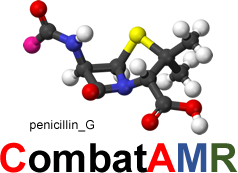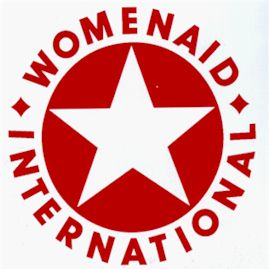GLOBAL HUMAN RIGHTS CAMPAIGNS
A committed defender of human rights for all, Pida Ripley has actively promoted and campaigned for the greater recognition and furthering of human rights of women and children. Drawing global attention to the cause of those whose human rights are being denied, she pioneered awareness raising and action about the Rape Camps in Bosnia (campaigning for rape in war to be recognised as a war crime); the abuse of Afghan women and the trafficking of human beings.
Despite slow gains and improvements achieved in recent decades, the reality for women globally is a litany of gender discrimination and abuse. The human rights of women and of the girl child are an inalienable, integral and indivisible part of universal human rights. If human rights are to be universally respected and protected, then they must apply to the lives of over half of the human race - women.
"Equality for women and girls is not only a basic human right, it is a social and economic imperative". Ban Ki-Moon, Former UN Secretary-General.
SILENT SUFFERING - STOP FGM

A former colleague at the Greater London Council, Marion Rowe, MP, successfully introduced the Bill on FGM in 1985. One of WomenAid’s first awareness campaigns was for the cessation of Female Genital Mutilation (FGM) - the unnecessary and damaging mutilation of millions of girls and women. This cultural practice causes girls and women debilitating long-term pain and suffering. Despite some gains, this mutilation continues in many parts of the world. A real tragedy is the negligible legal action taken by the UK against the UK based perpetrators.
Between 100 and 140 million women and girls alive today have been subjected to female genital mutilation - WHO believes the real figure is more likely to be 200 million as it is hard to track exact numbers. On average most girls are cut at 10 years of age and before the age of 15. There are 29 countries where FGM is most prevalent, 26 in Africa and 3 in the Middle East. Most women don't agree with FGM but due to societal and cultural pressure they consent. In Sierra Leone, Chad and Guinea more men than women are against the practice. Overall a majority of men and women agree it should end.
Shockingly it is estimated that even in the US that 500,000 women have undergone or are at risk of being subjected to the practice - despite it being illegal. It is estimated 3 million girls are at risk annually.
- seven girls every minute - over 3 million girls a year suffer genital mutilation.
- An estimated over 140 million girls and women in the world are genitally mutilated.
For more information see: FGM Background | FGM: UK Government response | FGM A U.N. Campaign
LATEST NEWS: AT LAST SOME ACTION to prevent UK children undergoing FGM but who shouted OBJECT to the Female Genital Mutilation Bill getting a second reading?
Note the date: 2nd reading: House of Commons | 25.01.2019
TELL THE WORLD Campaign on behalf of Bosnian ‘Rape Camp’ Survivors 1993 - 1997

In late 1992, while assisting women refugees in Bosnia, many highly traumatised women began to tell of the existence of ‘rape camps’ and urged Pida Ripley to "tell the world" of the existence of such brutality.
The women said ‘Don’t call us victims – we are survivors!’
Pida Ripley orchestrated a global human rights media campaign, ‘Tell the World’, which drew international attention to the existence of ‘rape camps’ being used as part of the appalling ethnic-cleansing strategy and the use of rape as part of Serbian military strategy. Young girls and women were rounded up and incarcerated in various buildings such as schools, hotels where they were brutally and multiply raped day after day. Many who attempted to escape were returned to the camps massively brutalised then shot. The Serbian aim was to break the morale of the Muslim Bosnians.
Working in collaboration with Tresjevnka, a local highly active NGO, the first map of 16 of these camps was published and distributed globally.
The Campaign called for rape in war to be recognised as a war crime.
“We are glad that you organise women from England so quickly and your so supportive letter about our suggestions for a good and urgent coordination are first one. And your interest in our needs and questions for us about progression in our work are a first concrete action we received.”
‘Tresnjevka’ Women’s Group, Zagreb. (Produced first map of 16 rape camps in Bosnia.) 04.02.1993
“The representatives of the International Criminal Tribunal for the Former Yugoslavia and I were pleased to meet you ... in Geneva last week. The sincere tone of the discussion clearly revealed our common ground and concerns. I am confident that productive cooperation between the Tribunal and the NGO community can effectively assist in the restoration of dignity to the women of the former Yugoslavia. Thank you once again for the opportunity to introduce ourselves.”
Judge Richard Goldstone, Prosecutor International Criminal Tribunal for the Former Yugoslavia. 26.10.1994
NB: Judge Goldstone's work investigating violence led directly to him being nominated to serve as the first chief prosecutor of the United Nations International Criminal Tribunal for the former Yugoslavia and for Rwanda from August 1994 to September 1996. [2] He prosecuted a number of key war crimes suspects, notably the Bosnian Serb political and military leaders, Radovan Karadžić and Ratko Mladić.
EC Investigative Mission into the Treatment of Muslim Women in Former Yugoslavia
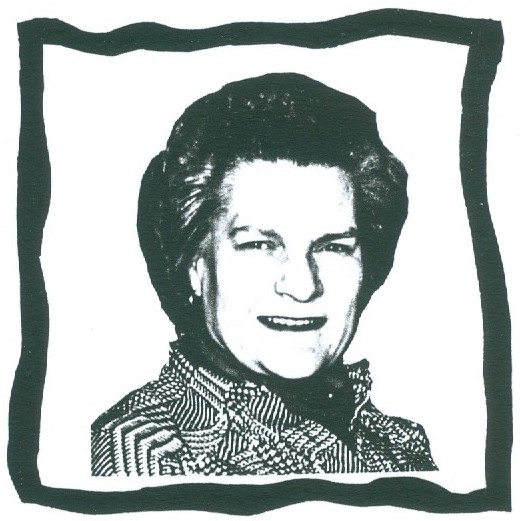
WomenAid was acknowledged as having taken the ‘lead’ on this issue by Dame Anne Warburton who undertook the EU Investigative Mission into the Treatment of Muslim Women in Former Yugoslavia. Subsequently Pida organised the official UK presentation of the Warburton Report on International Women's Day (IWD) as an IWD inaugural Lecture at the Royal Institution.
Warburton Report - EC Investigative Mission into the Treatment of Muslim Women in Former Yugoslavia estimated between 20,000 to 40,000 young girls and women of all ages had been brutalised in the 'rape camps' during the Bosnian war. Summary: Warburton Mission II Report: EC Investigative Mission into the Treatment of Muslim Women in the Former Yugoslavia
“The Mission which I led came to a formal end in February, when we reported our findings to the Council of Ministers…In the circumstances I thought the best thing to do would be to send a copy of your letter to Ms Pida Ripley, Director, WomenAid. This organisation has taken a lead in this country in coordinating support for Bosnian women." Full Report Warburton Report - EC Investigative Mission into the Treatment of Muslim Women in Former Yugoslavia
Dame Anne Warburton, Head EC Investigative Mission into the Treatment of Muslim Women in F. Yugoslavia. 02.06.1993
WomenAid Women in Black Wednesdays
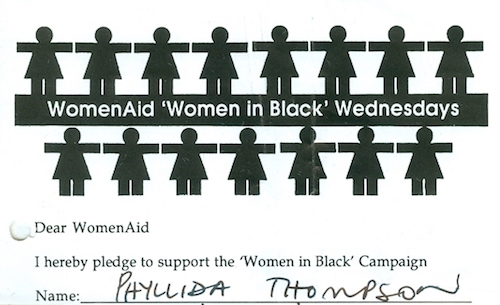
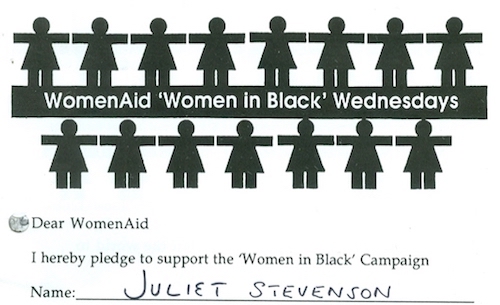
WomenAid worked in solidarity with the Women in Black Campaign initiated by Serbian women in Belgrade and many women and celebrities in the UK signed up to wearing black every Wednesday.
Psycho-social Support Centre - Network Zagreb
Simultaneously Pida established Network Zagreb, a psycho-social support centre where, for several years, psychologists provided counselling, individual and group therapy and multi-level support to traumatised women, children and some men who had been incarcerated in the notorious camps.
Pida listened to their expressed needs and consequently devised the first small grants initiative, whereby women survivors were provided with small financial grants. Invitations were given to women and children to visit, by appointment, the ‘Secret Wardrobe’ where, with dignity, they could choose personal clothing , underwear, shoes - as if in a shop. WomenAid psychologists acted as their assistants, which helped to gain the confidence and trust of the traumatised refugees.
“We often mention you. The women say you provided the right help for them. They praise you and they are grateful to you for your efforts and endeavour.”
Association of Bosnia & Herzegovina “B&H Woman” Zagreb 07.09.93
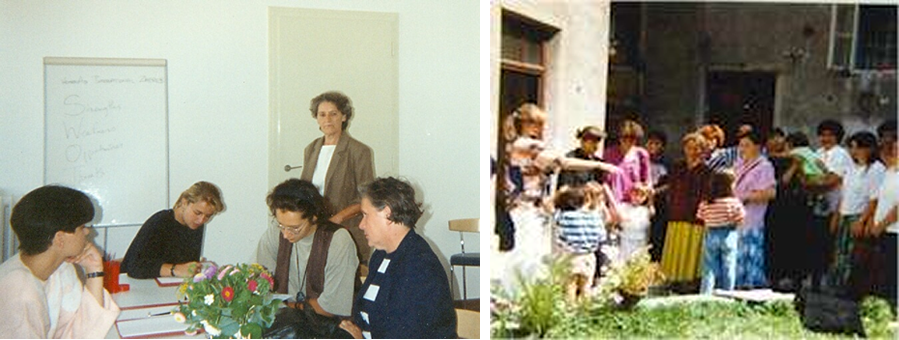
Your support and money you gave me, a 72 year old woman who has lost everything, made me start crying. I don't know if that was because of sadness that I became a refugee or happiness that I am not alone and there are good people and good women all over the world who think about me. Thank you very much for what you are doing for us and for the money which means a lot to me."
Sejida Lalic, Bosnian refugee
LIVING SHADOWS Solidarity Campaign on behalf of Afghan Women. 1996 - 2000
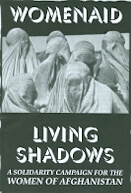
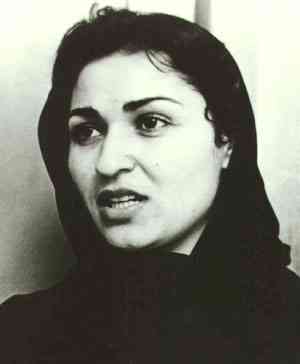
never forgotten.
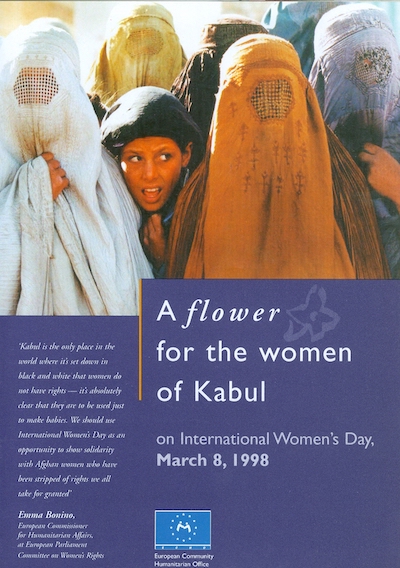
In 1996-7 Pida Ripley began promoting the cause of Afghan women who were being turned into ‘voiceless shadows’ by the Taliban’s flagrant denial of the basic human rights of women and girls.
WomenAid partnered the Revolutionary Association of Afghan Women, RAWA, - providing financial support as well as promoting widely the resistance activities of these courageous Afghan women opposing the Taliban and its regressive decrees. WomenAid launched 'Living Shadows' – another human rights campaign which was promoted globally, actively supported by international and national non-governmental organisations, religious groups, trade unions, student unions and the media. In 1998-99 the European Parliament called upon the international community to take action in support of Afghan women. For more information visit the archive site.
STOP TRAFFICKING 1998 - 2005
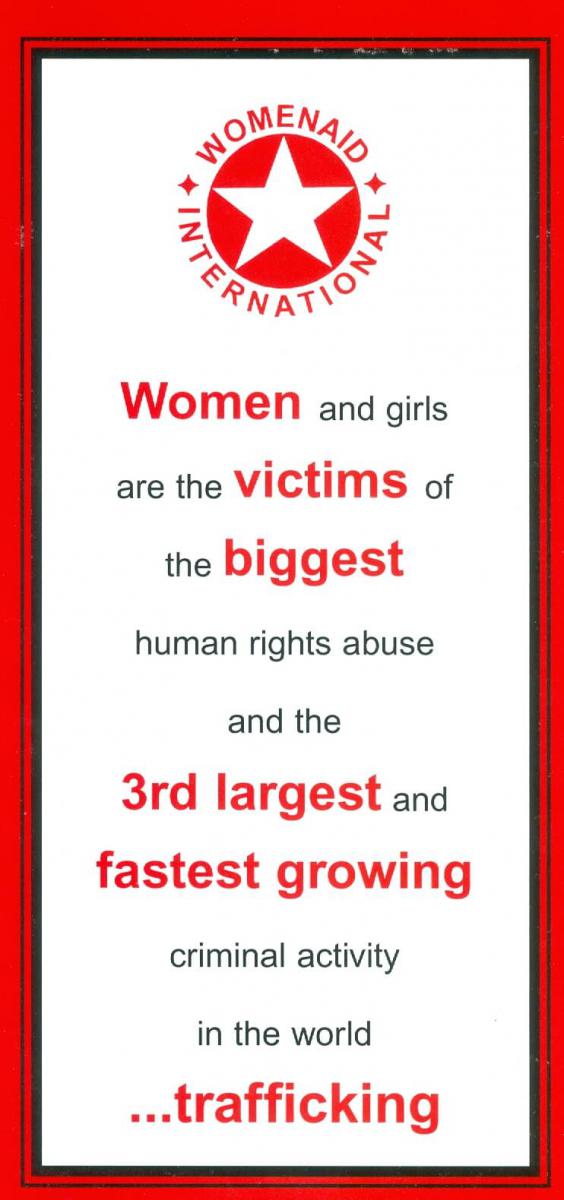
Pida pioneered anti-trafficking awareness, developing another major human rights campaign, Shattered Lives - Stop Trafficking’ – once again a global campaign, and actively supported by international and national non-governmental organisations, religious groups, trade and student unions as well as the media.
A main aim for WomenAid is to act as a catalyst for global and national legislative change and ensure victim assistance programmes are institutionalised within a respective legal framework.
WomenAid established an office in Tirana and began providing assistance to the first refugees arriving from Kosovo. Working in Albania during the 1998/99 Kosovo crisis, Pida was further alerted to the growing incidence of highly vulnerable women and girls being brutally abducted directly from refugee camps, others being ensnared by criminal gangs and abducted and traded for sexual purposes. This led her to create a high profile UK Anti-Trafficking (UKAT) Network Platform.
“Thank you Pida, that you’re helping my country. ‘A friend in need is a friend in deed. I didn’t know that we have to live this 1999 year. Living at the edge of this century and we couldn’t imagine to have such a bloody spring and we are trying to survive because we are mothers and for the sake of life we all must do everything we can to survive.”
Meri Lalaj, Albanian writer ‘Kapercyell’. 11.04.1999
